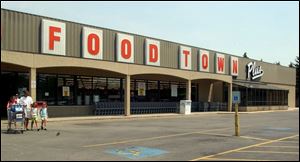
20 of last 26 Food Towns sold
6/25/2003
Shopping traffic was sparse at the store on Michigan Avenue in Waterville yesterday.
Spartan Stores Inc., which is dissolving the Food Town grocery chain in northwest Ohio and southeast Michigan, said yesterday it has deals to sell 20 of its remaining 26 Food Towns.
The company, which disclosed yesterday it lost $122 million in its latest fiscal year, said the supermarket sales will generate $25 million to $30 million it will use to pay down its debts.
The news, part of the firm's year-end financial report, is the first acknowledgement by the Grand Rapids, Mich., of how many Food Towns it has sold.
No details were provided about who bought which stores, or which six are left unclaimed. The firm said it is still “exploring options” on the six.
Company spokesman Jeanne Norcross would not comment even on when the sales might close.
The deals are subject to some undisclosed conditions and are not final.
“There is not a single purchaser, so we can't give a specific date or time for each one,” she said.
The Blade, using knowledgeable sources, has reported on the sales of nine stores in recent weeks.
Kroger Co. has purchased Toledo stores at 1415 South Byrne Rd. in the Southland Shopping Center and at 5201 Suder Ave. as well as a Fremont store; Kazmaier's Five-Star Market bought the Perrysburg store; Rick Kouza, a Detroit businessman, bought a store on Telegraph Road in Monroe and one in Rockwood, Mich., plus one closed in April at 1703 Airport Hwy., Toledo; Polly's Food Service, which owns Country Market, bought the Adrian store; and Missler's IGA of Willard bought the store in Willard.
Kroger has been interested in Food Town sites, as has Giant Eagle, Geyer's Market Inc., and others, sources familiar with the transactions have said.
The highly competitive metro Toledo grocery market has been tough on Food Town, Spartan has acknowledged in previous financial reports. Deep discounting by other area grocers and the addition of competitors has hurt Food Town sales, and in turn, Spartan's profits.
Spartan, which bought the Food Town chain in 2000, closed stores last year and 13 more in April, when it said it would close or sell the remaining 26 Food Towns.
The company plans to keep its Pharm discount drugstores, which it purchased with Food Town. Until the last fiscal quarter, however, the company said its Pharm sales were strong, but it revealed those were “cannibalized” by the close-out sales at its Food Towns.
The company's financial report, filed after the stock market closed yesterday, said it had a loss of $6.15 a share for its fiscal year ending March 29, compared with a profit of 50 cents a share, or $9.9 million, for the previous year.
Much of the losses are blamed on charges for discontinued operations and write-downs of asset values.
Sales for the year were down 9 percent to $2.1 billion from $2.3 billion.
For its fiscal fourth quarter, the firm said it lost $21 million, compared with a loss of $5 million for the same quarter the previous year. Sales in the quarter dropped nearly 7 percent to $189 million from $202 million a year ago. The declines were blamed on a late Easter, merchandising programs that did not meet expectations, and on competition.
Food Town stock closed yesterday at $2.64 a share on the Nasdaq stock market.
In February, Spartan announced it lost $57 million in its third fiscal quarter, the third consecutive period it suffered a loss, reflecting the company's poor operating performance in metro Toledo.
Spartan said it is working toward reducing its long-term debt.
For its first fiscal quarter this year, which ends within days, the company said in a statement it was pleased with its “early retail sales results.” It said those numbers demonstrate “swift progress despite the difficult and competitive environment.”
Although Ms. Norcross said sales trends are improving and the firm is taking appropriate steps to return to profitability, the firm's financial report says that for the final four-week period of its current fiscal quarter, same-store sales are expected to be flat.
“It has been a difficult year for Spartan Stores and particularly disappointing because we fell well short of our original performance expectations,” Chief Executive Craig Sturken said in a statement.
Spartan has been aggressively implementing new marketing and merchandise programs, making management and organization changes, and developing new feedback systems that are leading to improvements, said the company leader who took over in March.